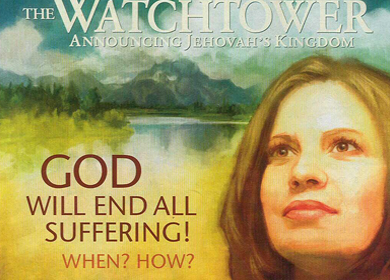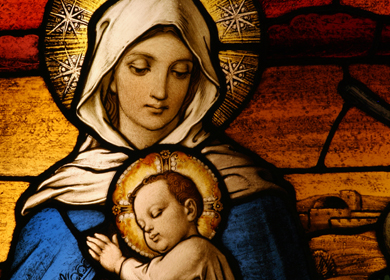Islam – Religion of Submission
By Beverly Joseph

Islam is estimated to be the world’s fastest growing religion with adherents of approximately 20 percent of the world’s population. That being the case, should Christians simply sit back and watch as Islam rises without concern for the gospel, or should we engage our Muslim friends, neighbors, co-workers and acquaintances for the sake of the gospel? Choosing the latter requires preparation as the likelihood is that you will encounter inquisition and antagonism as well as, perhaps, honest curiosity.
Understanding the fundamentals of Christianity and Islam are a minimum necessity. Being able to explain misunderstood Christian doctrines and to question Islamic doctrines may also be helpful. What is absolutely required, however, is to treat Muslims with humility and respect, as 1 Peter 3:15 states, “But sanctify the Lord God in your hearts, and always be ready to give a defense to everyone who asks you a reason for the hope that is in you, with meekness and fear.” That being said, the following is a brief discussion of some of the basic facts regarding Islam including when the religion started, God in Islam, the Qur’an (Islam’s holy book), sin according to Islam and Islam’s plan of salvation.
When Islam Started
Islam, meaning submission, began when its prophet, Muhammad, began receiving revelations in 610 A.D., which ultimately comprised the Qur’an. Nevertheless, Muslims claim that the message of Islam has been since the beginning of time. According to Islam, some 124,000 prophets preached the message of Islam to different people groups throughout history culminating with Muhammad. The basic message is summarized by the Islamic creed, called the Shahadah, which is recited, “there is no god but Allah and Muhammad is Allah’s Apostle.” Reciting this creed is the first of the five obligations called the Pillars of Islam. The second obligation is called Salat, which is prayer in 17 cycles spread over five times a day. The third pillar is Sawm, or fasting during the month of Ramadan (per the lunar calendar) from sun up to sun down. The fourth pillar is called Zakat, which is the giving of alms totaling two and a half percent of income. Finally, the fifth pillar is the Hajj or pilgrimage to Mecca, Islam’s birthplace (to be performed once during a Muslim’s lifetime). Islamic beliefs include the belief in one god, angels and jinn (spiritual beings – some good and some evil), belief in the holy books (including the Qur’an, the Torah and the New Testament), the Day of Judgment and jihad (meaning struggle, thought by some to indicate holy war).
God
The Islamic god, Allah, is an impersonal supreme being. The name Allah, means god in Arabic and was the name of the supreme god in the pagan practice that preceded Islam among Arabs. Muhammad’s message did not establish the existence of one god, but denied the existence of lesser deities. Though Allah has 99 names in Islam which provide a basis for who he is, he is not bound to any of these descriptions, so he cannot be known. Allah’s will is supreme, thus if he wills to be contrary to his names, he may do so. This paints a stark contrast to the God of the Bible who is bound to His character which is known to be loving, gracious, slow to anger and true. Allah “does not love those who ignore His commands” (Surah 3:32) while Jehovah “so loved the world that He gave His only begotten Son” (John 3:16).
The Qur’an
The Qur’an claims it is the verbally inspired Word of God as copied from the original in heaven. The Qur’an contains a collection of progressive revelations given to the Islamic founder and prophet, Muhammad. It is written in Arabic which is considered Allah’s heavenly language, divided into 114 surahs (chapters), and generally arranged from longest to shortest surah. When Muhammad began receiving these revelations, he initially believed he was being tormented by an evil spirit, but his wife Khadijah convinced him that he was in fact hearing from an angel (later believed to be Gabriel). Interestingly enough, the revelations received by Muhammad seemed to correlate to his current circumstances. If viewed in a progressive or chronological manner, the revelations Muhammad received in Mecca were rather peaceable toward Jews and Christians, while the revelations received in Medina, after his exile from Mecca and his gain of followers and military might, became domineering and violent. After Muhammad’s death there were numerous versions of the Qur’an as Muhammad was illiterate and his followers had written down his recitations on available scrap material. When debate arose over which version to follow, one of Muhammad’s trusted scribes, Zayd ibn Thabit, was turned to for an accurate compilation. By Zayd’s own account, he looked for the Qur’an and collected it from the scrap materials and men who knew it by heart. Despite this account, popular orthodox Muslim belief holds that the Qur’an was arranged in the same form that we have today under Muhammad’s and Gabriel’s direct supervision. It is important to understand that Muslims also revere the Bible. They believe that four of the highest ranking prophets were given books of divine revelation: Moses, who was given the Torah, David, who was given the Psalms, Jesus, who was given the Gospel, and Muhammad, who was given the Qur’an. However, an important doctrine in Islam is that of tahrif, or corruption of the Scriptures. That is, Muslims believe that Jews and Christians were responsible for corrupting the Scriptures, thus the Bible we now have is not the original (they claim that all the prophets were, in fact, Muslims who preached the message of Islam). Thus, the Qur’an abrogates earlier holy books. Additionally, Muslims have a collection of what are believed to be Muhammad’s teachings together called Hadith. These teachings comprise much of Islamic law.
Sin
According to Islam, everyone is born Muslim, but may fall away based on their circumstance (to revert, one must simply profess the Shahada). Likewise, Muslims believe that humans are born innocent and free of sin. Therefore, external influences make man what he becomes. Sin that is committed can be forgiven, if Allah wills, when repentance takes place. Islam’s concept of sin is very different from Christianity’s in that sin is not thought to be a human condition (passed down) and atonement for sin is not required. There is one unforgivable sin in Islam called shirk. Shirk is associating a partner with god. Christians, who believe in the triune nature of God, are thought to commit this sin.
Salvation
Muslims believe that their good and bad works are recorded and weighed before Allah to determine whether they will enter Paradise (a place where all pleasures, even sexual, are permitted). Of course, even if it is determined that your good works outweigh your bad, Allah may determine that you may not enter Paradise. Even Muhammad’s destiny was not certain. In contrast, Christian belief in a Holy God who is entirely set apart in purity from fallen humanity, results in a separation from God which cannot be repaired by human effort. Rather, faith in Jesus Christ, who transferred our sin for His righteousness on the cross, paying for mankind’s sin and bridging the gap between man and God, is all that is required to enter heaven (God’s dwelling place where joy abounds in holiness). If one truly puts their faith in Jesus Christ, then he or she is saved. 1 John 5:13 says, “These things I have written to you who believe in the name of the Son of God, that you may know that you have eternal life, and that you may continue to believe in the name of the Son of God.” The Muslim plan of salvation is not only uncertain, but it indicates that Allah is not holy both because he can be reached by works and because his heaven is not a place of holiness.
Some Thoughts
Understanding another’s beliefs is helpful in dialoging with them, but it is paramount that you also know why you believe what you believe. For discussion, some questions you could ask a Muslim (should the context warrant) are:
Is God able to preserve His revealed Word to mankind? The Qur’an states, “The word of your Lord is complete in its truth and justice. No one can change His words: He is All Hearing, the All Knowing” (Surah 6:115).
Muslims believe that Jesus was replaced on the cross. Why would Allah allow the Romans, Jews, even Jesus’ own followers to be deceived by replacing Him on the cross? Does this not imply that Allah is capable of deceit?
Muslims believe that Ishmael was the son that Abraham went to sacrifice before God stopped him and provided an animal to sacrifice. Regardless of this differentiation of the story, a question arises. If salvation is only a matter of rewarding those who do good, and if God’s purpose was only to test Abraham’s obedience, why then was there a need for “a momentous sacrifice” as stated in the Qur’an?
Beverely can be reached at [email protected].
Universalisim – All Roads Lead to Heaven
By Marisa Zeppieri-Caruana

If you are familiar with the name Rob Bell, then you are probably aware of the media frenzy that has been circling around his newest book, Love Wins, and the opinions of many who feel that he is teetering on the fence towards beliefs that stem from Universalism. For those of you that are unfamiliar with the term Universalism, here is a generalized definition: It is a religious doctrine that is all inclusive (includes all humanity) and holds no absolutes on the path to salvation. It espouses that everyone is on their own path to God or enlightenment, and although there are many different paths, we are all headed in the same direction.
Also, Universalism teaches that there is no need for a Messiah to redeem you from sin and that all religions are worshipping the same God, but in different ways. There are even some world religions that accept certain aspects of Universalism. Read on for more specifics about this philosophical and religious doctrine such as its history and its teachings on subjects such as sin and salvation.
History
Though modern organized Universalism has been attributed to John Murray, Elhanan Winchester and Hosea Ballou, (circa: 1700’s) its roots go much deeper. Followers of Christian Universalism date its beginnings back to Origen and St. Gregory of Nyssa (circa: 3rd century). The Universalist Church of America was formed in 1778 and later consolidated with the American Unitarian Association in 1961 to then form the Unitarian Universalist Association.
What They Believe
Universalists believe in a loving God and negate the belief of hell and punishment as this is in direct contradiction to a God who loves. It has become a humanistic movement that accepts all religious creeds and personal philosophies. They believe that followers of different religions are essentially all on the same path of enlightenment and have several common denominators that will ultimately lead them to the same destination. They express and desire an interfaith unity and community with the world.
Universalism promotes modern spirituality (new age, etc.) and is based on liberalism and tolerance that opposes clear Bible teachings. The concept of hell and eternal punishment is nonexistent to the Universalist philosophy, making the need for a Savior insignificant. No matter what your lifestyle or your beliefs are in God, Universalists teach that you will be saved no matter what.
Example Mission Statements and Statement of Beliefs
To gain a clearer, more concise understanding of what Universalists believe, here is an actual description from a Unitarian Universalist Church here in the United States:
We believe that we’re a part of life, and owe something back to the world for the gift of life.
We believe that almost all religions are saying that we are precious people who need to treat everybody else as though they are precious, too.
We believe that we are supposed to live in such a way that, when we look back on our lives, we can be proud, and can make those we care about proud.
We believe that truth, justice and compassion are requirements for living.
We believe that love is better than hatred, understanding is better than prejudice, and that if there is ever to be a better world, people of widely differing beliefs will have to help each other build it.
We believe that, down deep, all people of goodwill hold these same beliefs and that every individual should feel encouraged to develop a fulfilling philosophy of life.
Their mission statement makes it quite clear that the Word of God is not considered an absolute truth and each person decides what truth means to them. Here is the Mission Statement from the same church: With historical roots in the Judeo-Christian tradition, our liberal religion keeps an open mind to the spiritual questions people have asked for centuries. We are a “non-creedal” congregation, which means that we seek religious truth through personal experience, conscience and reason – not from any book or religious authority.
Things to Consider
This movement embraces a high intellectual discourse. Although they tout truth, justice, compassion and love in their belief system it is all performance based and does not embrace direct interaction or experience with God Himself. They will claim that in acting out the “Christ Consciousness” (Christ being the example of behavior for us), that they are already at one with God. Further scrutiny on the subject and beliefs of Universalism will show that it originates from the first lie in the Garden of Eden, when Satan told Eve that she would become like God if she ate the fruit from the Tree of the Knowledge of Good and Evil. Universalists believe that they are their own savior and will obtain salvation in their own way and on their own path.
Things to Remember When Speaking with a Universalist
Universalists tend to spiritualize the Bible and Christianity – their perception differs from Christian interpretations. For example, in regards to Salvation, where Christians believe that Christ paid the price for our sins, they feel that they will attain salvation by their own actions and path and doing “good works” during their lifetime.
Universalists believe that every path leads to God and that Christianity is just “one way”. Investigate and do the work to learn as much as you can about your beliefs and the beliefs of other religions so that you can hold a dynamic discourse and expose false teachings for what they are.
Marisa can be reached at [email protected].
Jehovah's Witness – The Watchtower
By Karla McLaren

It’s Saturday morning and in the middle of your routine you hear a knock at the door. Whether you pretend you’re not home (even though there’s a car in your driveway and the lights are on) or you decide to open the door, it’s important for you to know exactly what’s waiting for you on the other side. Yes, it’s a Jehovah’s Witness. Understanding what they believe will equip you with the tools that you need to see the differences between your beliefs and theirs.
History
In the 1870’s, a man named Charles T. Russell began a religion that is known today as the Jehovah’s Witnesses. They have over a million members in the U.S. alone and their place of worship is called the Kingdom Hall. Jehovah’s Witnesses use their own translation of the Bible called The New World Translation of the Bible. Their Bible was interpreted by Fred Franz, George Gangas, Albert Schroeder, M. Henschel, and Nathan Knorr. Fred Franz was the only member of the panel that had any training in Greek or Hebrew and all but Franz had little more than a high school education. Fred Franz had studied Greek at the University of Cincinnati, but he dropped out after only two years and was self-taught in Hebrew. (See “Crisis of Conscience” by Raymond Franz; Commentary Press, Atlanta; 1983 edition; footnote 15; page 50)
Within The New World. Translation of the Bible are many differences compared to other Christian Bibles. An example of this translation can be seen in John 1:1. In The New Living Translation, John 1:1 reads, “In the beginning was the Word and the Word was with God and the Word was God.” The New World Translation (Jehovah’s Witness Bible) states John 1:1 as saying, “Originally the Word was, and the Word was with God, and the Word was a god.” Since the original rendition of their Bible, many subsequent changes have been made to reflect changes in doctrinal thinking.
What They Believe
Jehovah’s Witnesses are under the authority of a “Governing Body” that consists of 10-15 men. They are taught that the Governing Body is the only one that has direct guidance from God. The Governing Body releases publications of The Watchtower, which their followers must use to help them interpret God’s Word. They are taught that without The Watchtower and other various publications that the Governing Body releases, it is impossible to understand the things of God. Jehovah’s Witnesses also believe that they are the only people that will be saved. Questioning The Watchtower Societies teachings could get you “disfellowshipped” from the church. Once disfellowshipped, you are no longer saved. Salvation requires that a person accept The Watchtower interpretation of the Bible, be baptized as a Jehovah’s Witness and be a member in good standing that performs the works that the Governing Body assigns. They do not believe in the Trinity; they believe that Jehovah is the Supreme Being, Jesus is the son of God and the Holy Spirit is a force that God uses to interact with the world. They believe that Jesus was the Archangel Michael before he took human form. Once Jesus was born, he led a sinless life and was crucified on a stake, not a cross. Displaying a cross is considered idol worship. They do not believe in the physical resurrection of Christ but rather that he was more of a “spirit creature”.
Jehovah’s Witnesses also do not believe that there is a hell. According to their doctrine, when you die, you cease to exist and have no consciousness until God resurrects you by building you a new body from His memory of you. Only 144,000 people will spend eternity in Heaven with God and Christ as “spirit creatures”. Those 144,000 will help rule over the rest of the saved Jehovah’s Witnesses who are resurrected and will spend eternity on earth. Once you become a Jehovah’s Witness you are forbidden from reading any material from ex-Jehovah’s Witnesses as well as anything not printed by the Watchtower Society. It also forbids members from researching the church’s past.
Opponents of the Faith
Cal Lehman, an ex-Jehovah’s Witness of 35 years and Elder for over 20 years, currently runs a ministry that reaches out to this group of people. Through www.towerwatch.com, he is able to minister to current and ex-Jehovah’s Witnesses and also gives Christians tips on how to be effective witnesses to them. Regarding their version of John 1:1, Lehman wrote, “Since my name is used and our Manual Grammar of the Greek New Testament is quoted on page 744 to seek to justify their translation, I am making this statement. ‘The translation suggested in our Grammar for the disputed passage is, ‘the Word was deity.’ Moffatt’s rendering is ‘the Word was divine.’ William’s translation is, ‘the Word was God Himself.’ Each translation reflects the dominant idea in the Greek. For, whenever an article does not precede a noun in Greek, that noun can either be considered as emphasizing the character, nature, essence or quality of a person or thing, as theos (God) does in John 1:1, or it can be translated in certain contexts as indefinite, as they have done. But of all the scholars in the world, as far as we know, none have translated this verse as Jehovah’s Witnesses have.'”
Things to Consider
As Christians we are called to speak the truth in love. If God is calling you to learn more and open your home to a Jehovah’s Witness it is important to remember a few things. Number one, pray. You’ll need God’s guidance every step of the way. Number two, love. When you speak with them, don’t have the kind of attitude that says, “I’m right and you’re wrong”. Although you may feel that they are being misled, they’re genuine in their will to do God’s work and if they choose to leave they’ll need love and support. To learn more about how to be an effective witness to Jehovah’s Witnesses visit www.Towerwatch.com or contact your church.
Catholicisim – Salvation Through Baptisim
By Marisa Zeppieri-Caruana

Catholicism is a religion that spans almost 2,000 years. It has its origins in the teachings of Jesus Christ and the Holy Scriptures and it is estimated that there are approximately one billion Catholics worldwide. In the United States, Catholics are estimated to be 24 percent of the entire population. The legalization and founding of the religion in the Roman Empire was by the decree of Emperor Constantine in 313 C.E. It became the state religion of the entire Roman Empire (Eastern and Western). The institution of the Papacy was based on the confession that Jesus made to Simon Peter in Matthew 16:18 which says, “And I also say to you that you are Peter, and on this rock I will build My church, and the gates of hell shall not prevail against it.” Catholicism believes that Saint Peter was the first Pope of the Catholic Church, representing God on earth. This belief has established the succession of Popes following after Saint Peter, as God’s representatives on earth and as the leaders of the Catholic Church. The Pope is called the Vicar of Christ. The Vatican Ecumenical Councils were established to address the needs and doctrines of the Church. The hierarchy of the Church starts with the pope and descends to cardinals, bishops, deacons, priests, nuns, monks, missionaries and laity.
History
Catholicism expanded throughout the Roman Empire. Eventually, the Greek Church created an Orthodox Catholicism because of doctrinal disputes with the Latin Church. These tensions created the Great Schism between the Eastern and Western Church. In 1095 A.D., Pope Urban gave the decree that began the first Holy Roman Crusade. The Pope hoped that the Crusades would unify the schism between the Eastern and Western Church. The Crusades were a period of widespread, rapacious bloodshed. During the Middle Ages, all schools and libraries were within the Church’s monasteries, convents and cathedrals. Eventually the schools were separated into lower and higher spheres of learning, ultimately leading to the creation of universities. These pillars of education quickly established intellectual achievements in the areas of metallurgy, new crop development, symbolic musical notation and the creation and preservation of literature. The Protestant Reformation began in the 16th century, over doctrinal, ritual and ecclesiastical disputes. The Reformation was led by Martin Luther, John Calvin and others. The Catholic Church experienced a great reduction of its authority in Western Europe because of the Reformation and the Age of Enlightenment which produced religious skepticism. During the Renaissance (14th – 17th Century) enormous cultural growth took place in literature, art, science, politics and religion. The Catholic institutions were graced with magnificent stained glass windows, paintings, frescoes and sculptures of Jesus, Mary, the Saints and Bible stories. The English reformation took place when King Henry VIII desired to have his marriage to Catherine of Aragon annulled. Because the Pope refused to annul the marriage, King Henry VIII established the Church of England. He enacted the Law of Supremacy which made the English Monarch the head of the English Church. All Catholic monasteries and churches were dissolved in England, Wales and Ireland. The Catholic Church still expanded by sending missionaries around the world to preach the gospel of Jesus Christ and to make disciples of the people.
What They Believe
The Catholic religion believes in a triune God of Father, Son and Holy Spirit. It also accepts the doctrine of salvation through baptism which bestows on the baptist the justification that comes through the passion of Jesus Christ. The Church believes in the virgin birth of Jesus through the Blessed Virgin Mary, His mother, and prays to her for intercession. Catholics also pray to the Virgin Mother when saying the Rosary over prayer beads. They also pray to many saints for intercession besides praying to God and Jesus. There are seven sacraments (signs of the sacred) of the faith which are: Baptism, Holy Eucharist (communion), Penance/ Reconciliation, Confirmation, Holy Matrimony, Holy Order (ordination of priests) and the Anointing of the Sick, known as Last Rites or Extreme Unction, which is a ritual of healing for the body, mind or spirit. The Roman Catholic Church believes in the existence of hell as a place of eternal damnation and purgatory as a place of waiting to get into heaven by deceased persons. Absolution occurs when a Catholic confesses his sins to a Priest and the Priest releases him from his sin. Another belief is that the Catholic Priest changes the Communion bread and wine into the actual body and blood of Christ through the act of Consecration. The Catholic Churches have a crucifix hung above the altar, and everyone must genuflect (kneel on one knee) when facing the altar. They also have fonts of Holy Water which the people dip their right hand in and then make the Sign of the Cross by touching the hand to the forehead, heart and then both shoulders. Their religion binds and obligates them to keep the Ten Commandments.
The Seven Capital Sins and the ritual of the Mass?
The Seven Capital Sins of the Catholic Church (which are commonly referred to as the seven deadly sins) are pride, covetousness, lust, anger, gluttony, envy and sloth. These Capital Sins are believed to be the cause of all sin. Catholics believe that they are commanded to perform the Great Commission of teaching all people the Gospel of Jesus Christ. The Catholic Church performs the ritual of the Mass. The order of the Mass starts with the Priests proceeding to the altar. Then there is Opening Prayer, the Blessing, the Sprinkling of Holy Water and the Releasing of the Incense. Following is the Rite of Penance, the Kyrie, the Gloria, the Liturgy of the Word, the Liturgy of the Eucharist, Communion, Concluding Rite and Dismissal. The Catholic Church also does not allow divorce and is a great force against abortion and euthanasia.
Recent Events/Issues
The Catholic Church has experienced problems of sexual abuse and misconduct. The U.S. Conference of Catholic Bishops study reveals that four percent of all Priests serving from 1950 to 2002 had faced accusations of sexual misconduct. Recently, the Church has decided to change it Roman Missal to a new English version which is closer to the original Latin version. The Latin version was changed into English during the second Vatican Council of the 1960’s. The new changes are effective on November 27, 2011, the first Sunday of Advent and the start of the new liturgical year.
Though Catholicism, like Christianity, believes that salvation comes through Christ’s work at Calvary, there are a few minor issues that are different from other Christian denominations. Some of these include praying to Mary and Saints, the issue of purgatory, the ritual mass and repetitive prayers (such as the Rosary). The Catholic Bible also contains the added books of the Apocrypha – something not included in Protestant Bibles.
To learn more about Catholicism, visit: www.catholic.org
Marisa can be reached at [email protected].
Mormonisim – God of Your Own Planet
By Justin Young

Upon hearing the word “Mormons”, many can’t help but think of the Tabernacle Choir, Salt Lake City, or—thanks to recent TV series like Big Love and Sister Wives—polygamy. But, how much do you really know about the history of the Mormon religion and what modern-day Mormons believe and practice?
Joseph Smith and the “Golden Plates”
“The Church of Jesus Christ of Latter-day Saints”, which is the full and official name of the Mormon Church, was founded by a man named Joseph Smith on April 6, 1830. On that day, by Smith’s own account, God the Father and Jesus personally appeared to him and told him not to become a follower of any organized Christian denomination. A few years later, Smith says he was visited by an angel named Moroni, who led him to a set of “golden plates” hidden near Smith’s home in upstate New York; plates upon which the Book of Mormon was transcribed. This Book tells the story of a people called the Lamanites – Jews from Jerusalem who had come to America and eventually became the people group we now know as American Indians. The Book of Mormon contains the writings of a man named Mormon, a leader of these Jews-turned-Native Americans, and recounts, among other things, alleged physical appearances of Jesus Christ in America.
After Smith’s translation of the Book of Mormon and under his leadership, the Church of Jesus Christ of Latter-day Saints (or LDS Church) began to grow and established several communities in Ohio, Missouri and Illinois. After Smith’s murder by an angry mob in 1844, his successor, Brigham Young, came to power and led the Mormon migration west to Salt Lake City where the church continues to grow and thrive to this day. According to the church’s official website, www.mormon.org, “the Church of Jesus Christ [of Latter-day Saints] has grown to a membership of nearly 14 million on six continents.” The term “Latter-day Saints” comes from Smith’s report of being visited by John the Baptist, who told Smith that God wanted him to return the church to the true, first-century gospel practiced by the early apostles, or “early-day saints”<br /

Comments